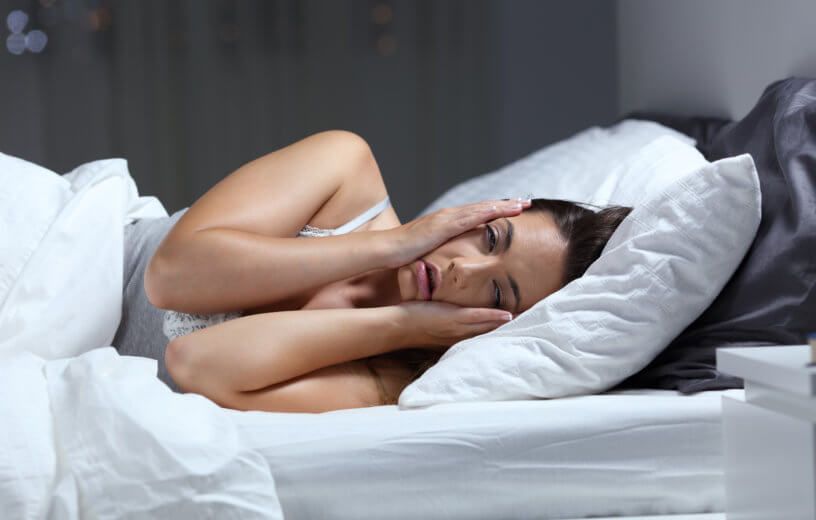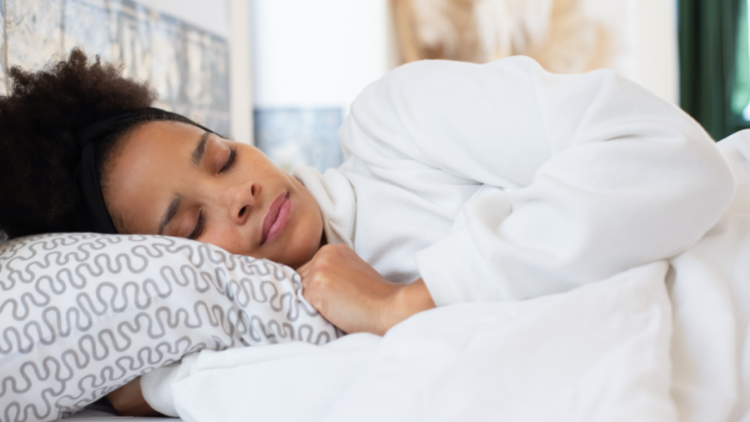Cannabis for Sleep | Benefits and What to Look Out For

Remember the dreamy feeling of a long, deep, and restful night’s sleep? Why is cannabis for sleep a big deal? How does it affect people? Is cannabis one of the more natural treatment options for sleep problems?
CANNABIS FOR SLEEP. DOES IT HELP?
Sleep should be a nightly reality, not a vague memory. In modern life, sleep is a necessity misrepresented as a luxury. We are biologically dependent upon sleep for not only optional functionality but also some pretty basic biological functions. Our bodies and brains need 8 to 9 hours of sleep per day to reset, restore and repair our bodies and minds. Those 8-9 hours also need to include each of the 5 stages of sleep in proper proportions. (More on the stages of sleep below.) Even one restless night can decrease brain power, reaction time, and physical and mental health performance and cause pain and inflammation.
Poor sleep quality also stimulates overeating, contributing to the weight gain often associated with aging. Despite the necessity of good, restorative sleep, 30-60% of adults report having poor sleep several nights a week, and upwards of 60% of women in perimenopause (the often symptomatic time period before the menstrual cycle stops) and menopause report disruptive sleep issues. The causes of primary insomnia, sleeplessness that is not due to medical or environmental causes, can range from a restless, racing mind, to stress-induced release of cortisol. Sometimes, the neurochemicals involved in sleep (serotonin or GABA) can become altered. Sleep also suffers with travel, disruption of routine, new shifts at work and daylight savings. Even a poor or unfamiliar mattress can have an effect on sleep quality.
The use of cannabis for sleep is not a one-size-fits-all solution but is a viable and often powerful sleep aid to combat insomnia. “Among people who use cannabis for medical reasons, such as pain relief, as many as 85% say it improves their sleep.” – Sleep Foundation, March 2022 If you have regular or chronic sleep problems, any natural solution that helps with sleep is worth exploring.
What does the research say?
Cannabinoids + proper dosage + terpenes = Zzzzzzz
Insomnia ranks as a top reason both men and women turn to cannabis for the first time. Many cite dissatisfaction with pharmaceutical sleep aids as a factor for their canna-curiosity. To understand the effects on sleep that cannabis can have, you need to understand the body’s endocannabinoid system. The 1964 discovery of THC (the chemical responsible for the psychoactive experience) and CBD (one of many non-psychoactive components in cannabis) led to the 1988 discovery of the endocannabinoid system (ECS), the largest receptor system and the master regulator of homeostasis in the human body.
The endocannabinoid system is responsible for restoring balance to our body’s cognitive, emotional and physical systems when they get out of whack. How does that work? Imbalance stimulates the body’s production of cannabinoids (called endocannabinoids). These endocannabinoids meet with cannabinoid receptors, which are found all over the body. When endocannabinoids meet and match to receptors, the biological result is homeostasis and balance. Yep, this includes balance for the sleep system. Cannabinoids from the cannabis plant can play the same key-man role as the endocannabinoids made by the body. Amazing.
Fun fact: Cannabinoid receptors are found on numerous sites in the human body. So many actually, the total number of endocannabinoid receptors in the body is believed to be greater than all other neuro-modulatory receptors found in the body COMBINED.
Guess what? The female reproductive tract is extremely dense with cannabinoid receptors. This makes vaginal suppositories an excellent delivery method for relief.
Cannabinoids: THC and CBD
THC
Now, let’s talk a bit about those cannabinoids THC and CBD. THC was recognized as a sleep aid after studies from the 1970s found to be true what Materia Medica knew in the 1800s. There are clear sedative effects with THC. THC is the chemical responsible for the psychoactive experience that often characterizes cannabis, but low doses and specific delivery methods can be used without psychoactivity. Small amounts of THC can increase deep sleep or total sleep time. High doses can have the opposite effect.
CBD
The effects of CBD are also dose-dependent with low doses providing relaxation and high doses causing alertness. CBD on its own doesn’t usually feel like a sedative, but typically provides physical relaxation, relief from inflammation and pain, and a calming effect on the nervous system. CBD may be just what a body needs to settle and be ready for sleep and can thus be an important part of sleep hygiene.
TERPENES
The powerful effects of cannabis are strongest when dosing is appropriate for the method of delivery and THC and CBD are combined with specific, relaxing plant terpenes.
If cannabinoids are the cake and proper dosing is the icing, then terpenes are the sprinkles on top. Terpenes are molecules in botanicals that make plants taste, smell, and behave in the way they do. Individual terpenes have specific impacts on sleep, mood, and cognition. Some terpenes are stimulating and some are relaxing. Lavender, for example, has large amounts of the terpene linalool. Linalool reduces inflammation, lessens pain, and has a sedative effect. No wonder most spas smell divinely like lavender. When terpenes like linalool and myrcene exist in the cannabis strain being smoked, sleep is likely. Some products, like Hello Again, build their own terpene profiles to provide specific, targeted effects. Hello Again vaginal suppositories combine THC, CBD, and a select profile of terpenes, provided by botanicals like lavender, chamomile, hops and valerian root.
Fun fact: chamomile, thought to be first used in ancient Egypt, has been used for centuries for its calming effect on the nervous system.
Another fun fact: Both Greek physicians Hippocrates (c. 460-377 BCE) and Dioscorides (1st century CE) prescribed Valerian root as a sleep aid. Galen (circa 130-200 CE), the physician to Roman emperor Marcus Aurelius, prescribed it for insomnia proving that the use of cannabis for sleeping has stood the test of time.
Other key terpenes for sleep include linalool, myrcene, terpinolene, nerolidol and phytol.

Ways to Consume Cannabis for Sleep
There are many ways to consume marijuana for sleep, but you need to find the method and dosage that works best for you. Inhaled marijuana has a duration of action that lasts 3-4 hours. I often hear from people that they have not been able to do without their sleeping pills when they smoke or vaporize their cannabis. They notice that they still get up in the middle of the night, typically 4 hours after they go to bed. It’s important to use cannabis in a long-acting form, such as suppositories, capsules, or edibles if you find you’re waking up in the middle of the night. Remember to take your cannabis medicine at least half an hour to one hour before you want to sleep as it can take at least that long to take effect depending on the delivery method.
Methods of Consumption
How you get your THC impacts psychoactivity as well. THC that is ingested or smoked will potentially have a psychoactive effect and onset times will differ Typically, ingested cannabis has a longer, less predictable onset time because it goes through the digestive tract. Smoked cannabis enters the bloodsteam quickly, through the lungs. THC that has contact with your skin will not deliver a psychoactive high. This includes suppositories that are placed inside the vagina or rectum and melt against the skin (and its receptors!) inside the body.
This is why Hello Again suppositories are able to use THC, even in high amounts (Hello Again Sleep formula has 20mg!) without the typical psychoactivity. Not interested in psychoactivity? Suppositories and other topicals can utilize higher levels of THC without delivering psychoactive effects. Topicals like creams and patches may take longer to take effect than suppositories because of the difference in skin type and receptor density.
Fun fact: Cannabis has been used since 500 B.C. for textiles and later consumed as medicine for a variety of emotional and physical ailments including insomnia and sleep disorders.
MORE ON SLEEP
There are 5 stages of sleep and within one night, sleepers rotate between non-rapid eye movement (NREM) and rapid eye movement (REM). Those stages are best described as drowsiness, light sleep, moderate to deep sleep, deepest sleep and dreaming.
1: DRIFTING BETWEEN BEING ASLEEP AND AWAKE
- Light, Non-REM sleep.
- Short.
- You may dream.
2: LIGHT SLEEP DRIFTING INTO STEADIER SLEEP
- More relaxation.
- Body temperature drops.
- Brain waves will quiet.
3: ENTER DEEP SLEEP
- Breath, heartbeat and temperature are at their lowest
- Most muscle relaxation. You could be difficult to rouse
4: DEEP SLEEP
- The healing stage of sleep.
- Tissue growth and repair, cellular restoration
5: REM SLEEP
- 90 minutes after you fall asleep with cycles every 90 minutes.
- Eye movement, brainwaves, heart rate and blood pressure near waking levels
- Most likely to dream and thus solidify memories and process emotions
- Temporary muscular paralysis while dreaming
Deep, restorative sleep accounts for between 12-23% of sleeping hours in healthy adults. So, in an 8 hour sleep, roughly 62-110 minutes are in deep sleep. It is during this phase that memories are consolidated, learning and emotions are processed and physical recovery occurs. Brain detoxification and rejuvenation of the immune system also happen during deep sleep. It is this phase of sleep that accounts for the symptoms of sleep deprivation if consistently shorted.
Compared to Traditional Sleep Aids
Cannabis offers an alternative to pharmaceutical sleep aids. In fact, most new cannabis users cite dissatisfaction with pharmaceutical choices for sleep. Women often experience amplified negative effects from pharmaceutical sleep aids. Lack of proper sleep accounts for a multitude of physical, emotional and cognitive effects. As you devise your sleep strategies, cannabis can be an important tool for overall health.
Risks and Side Effects
Cannabis has been recognized as a helpful sleep aid as use of THC for sleep can have effective results. As with any drug, there are associated risks and side effects.
Tolerance can affect Efficacy Chronic, high-dose, long-term THC use can result in sleep disturbance. Cannabis can also decrease in efficacy over time, necessitating a “tolerance break” to reset cannabis tolerance.
Cognitive Effects Although small doses can be beneficial, heavy cannabis use (daily or multi-daily use with large dosing) can have diminishing effects on memory, learning and attention.
Health Risks Smoking any substance can be damaging to your lungs, heart, blood vessels and tissues. Pregnant and nursing women should not consume cannabis.
Substance Abuse Cannabis is less addictive than opiods and alcohol. Long-term, chronic use can lead to a cannabis use disorder. Contact your doctor if you struggle to stop consuming cannabis.
Do you use cannabis and/or CBD products to help you sleep? Have they worked? Would you recommend it to a friend? Share your sleep stories with us.